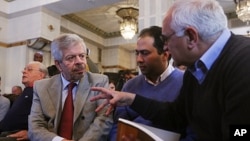As violence continues in Syria, and the United Nations struggles to get its truce observers into place, the Syrian opposition is splintering into even more factions.
Syrian forces continue to shell opposition strongholds. The opposition refuses to back down. And civilians continue to bear the brunt of the violence.
But in the far calmer surroundings of Paris, another Syrian opposition group was born last week, with plans to form a government-in-exile. It claims to have the support of opposition fighters and therefore to be "the legitimate representative of the Syrian people."
That is a phrase much used in this conflict. At a meeting in Istanbul last month, the international organization the Friends of Syria declared a different group, the Syrian National Council, “a” legitimate representative of the Syrian people. The group’s leaders say that means they are “the” legitimate representative.
Syria-watcher Chris Doyle, who has hosted various Syrian opposition figures at his London-based Council for Arab-British Understanding, is concerned about such competing claims.
“I think it’s really important to emphasize that just as the regime has no legitimacy and never did, the only way a Syrian movement can have legitimacy should be by the endorsement of the Syrian people through a ballot box,” he said.
Doyle says it is not realistic to expect the varied Syrian groups to unite under one political banner. Rather, he suggests a loose coalition sharing only the goal of ousting President Bashar al-Assad.
But the president continues to have considerable support among some groups in Syria. Former senior British and United Nations official Mark Malloch-Brown, now with FTI Consulting, says that makes it particularly important for the Syrian opposition to come together.
“The opposition doesn’t have the luxury, and shouldn’t allow itself to be irresponsible enough, to remain permanently divided," he said. "There needs to be an opposition negotiating platform. And somehow or other these groups have to show the statesmanship to come together in some way to agree on terms.”
There are few signs of that so far. And that may make it more difficult for the international community to convince Assad supporters inside Syria to change their allegiance.
“If they want a stake in the future political arrangements of the country, Assad needs to be jettisoned," said Malloch-Brown. "And so I think you will see tensions develop between the broader regime establishment and the Assad family.”
Malloch-Brown says making that happen will require help from Assad’s key foreign supporters, particularly Russia - help he says may eventually come if efforts to start negotiations fail - and as a last resort to avoid Western military intervention.
| Join the conversation on our social journalism site - Middle East Voices. Follow our Middle East reports on Twitter and discuss them on our Facebook page. |




